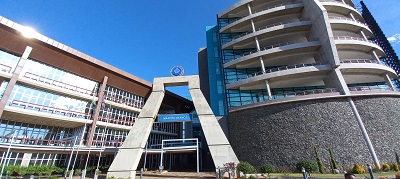By: Mpho Shelile
MASERU
The Central Bank of Lesotho (CBL) recently held its 112th Monetary Policy Committee (MPC) meeting, offering a detailed analysis of the prevailing global, regional, and domestic economies, as well as developments in financial markets.
This meeting served as a platform to assess and address economic challenges while providing strategic direction for economic recovery and growth.
Speaking on behalf of the CBL Governor, Dr. Maluke Letete, Chief of Corporate Communication Ephraim Moremoholo highlighted critical economic realities affecting Lesotho and beyond. His remarks painted a multifaceted picture of economic dynamics, emphasising the importance of adaptive monetary policy in ensuring stability amidst persistent uncertainty.
Despite the International Monetary Fund’s (IMF) global growth projections remaining unchanged since the January 2025 update of the World Economic Outlook (WEO), the global economic environment continues to face rising uncertainty. Moremoholo attributed this to ongoing trade tensions, geopolitical conflicts, and other destabilising factors.
“While the United States is forecasted to sustain economic growth in 2025, many European economies are expected to experience further deterioration,” he stated. However, Moremoholo expressed cautious optimism regarding Germany’s infrastructure development initiatives, which are anticipated to boost short-term growth, providing some relief to the European economic outlook.
Closer to home, South Africa, Lesotho’s largest trading partner, is grappling with rising inflation fueled by increased costs in energy, utilities, and housing. In response, the country’s central bank has opted to maintain its policy rates, a measure that has proven effective in alleviating inflationary pressures thus far.
These developments in South Africa have direct implications for Lesotho’s economic outlook, given the interdependence of the two economies within the Common Monetary Area (CMA).
The domestic economy has not been spared from the effects of regional and global economic turbulence. January 2025 saw a sharp contraction in economic activity, estimated at 4.5%. This decline is attributed to subdued demand in key sectors, including manufacturing, construction, and transportation.
Meanwhile, inflation in Lesotho has been on the rise, moving from 3.6% in January to 4.1% in February. Price surges in critical categories such as food, non-alcoholic beverages, electricity, gas, fuel, and transportation have placed significant strain on households and businesses alike, underscoring the vulnerability of the domestic economy to external shocks.
Adding to the challenges, reduced consumer spending on goods and services has further weakened economic activity. “The general public is spending less money on consumer goods and services,” Moremoholo remarked, describing this trend as a contributing factor to the economic slowdown.
On a brighter note, there has been a notable improvement in Lesotho’s fiscal position. Government operations reported a 22.1% increase in Gross Domestic Product (GDP), primarily driven by higher Southern African Customs Union (SACU) receipts. This increase in revenue has outpaced expenditure, providing some fiscal breathing room.
In light of these developments, the MPC has resolved to maintain the net international reserves at a minimum of USD 840 million. This decision is crucial for upholding the 1:1 exchange rate peg between the loti and the South African rand, ensuring currency stability amidst fluctuating economic conditions.
Moremoholo concluded by restating the resilience of global growth despite ongoing uncertainties. “Despite current challenges in global affairs, global growth is expected to remain resilient,” he said, offering a cautiously optimistic outlook for the future.


